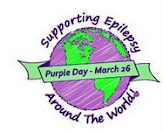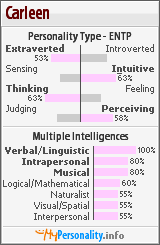Narcolepsy: "Narcolepsy is a chronic neurological disorder caused by the brain's inability to regulate sleep-wake cycles normally. At various times throughout the day, people with narcolepsy experience fleeting urges to sleep. If the urge becomes overwhelming, individuals will fall asleep for periods lasting from a few seconds to several minutes." (Narcolepsy Information Page)
Lately I've been thinking a lot about narcolepsy. My daughter halfheartedly jokes that she is convinced I have it. To illustrate her point (she is, after all, the daughter of an English professor!), she retells the story about me falling asleep while standing up and waiting for a flight in the Houston Hobby Airport. That's not the only example she has, it just happens to be her favorite.
I can, and do, fall asleep anywhere, any time. While it has been really convenient to blame it on the fact that I don't sleep well at night or that the after effects of a seizure cause it, I'm starting to think that the problem goes deeper than that. Maybe because I don't want to add another "-epsy" or "-ism" to my repertoire, I have never discussed this seriously with my neurologist. Oh, I've joked about it and even told her about the time I got up in the middle of the night, put the tea kettle on, and sat down at the computer to do some work only to awaken several minutes later to the smell of something burning. Thinking that I had let all the water boil out of the tea kettle, I rushed to the kitchen and discovered that I had actually put the electric can opener on the burner instead of the tea kettle and that it was on fire. Now I don't put the tea kettle on until I have been out of bed for at least fifteen minutes.
I've fallen asleep in class while students took exams, in the middle of a conversation, and with my head resting on the laptop keyboard when I thought I was working. I fall asleep in the morning, afternoon, and evening. Basically, when the need for sleep makes itself known, my body gives in regardless of where I am, what I am doing, or the time of day.
These sleep attacks are not the same as a nap. With a nap, I am in control; I make a conscious decision to lie down and sleep. The sleep attacks, however, happen without any prior planning or decision making on my part; they just happen. The episodes typically last less than ten minutes and when I wake up, I don't feel refreshed like I do after a nap. In fact, I usually feel more sleepy and have to consciously fight against falling asleep. It's very strange, really!
Maybe it's time to make an appointment with the neurologist. It would be nice to get an explanation of how I could fall asleep in the emergency room yesterday while my husband was hooked up to all kinds of machinery to rule out a heart attack!
Lately I've been thinking a lot about narcolepsy. My daughter halfheartedly jokes that she is convinced I have it. To illustrate her point (she is, after all, the daughter of an English professor!), she retells the story about me falling asleep while standing up and waiting for a flight in the Houston Hobby Airport. That's not the only example she has, it just happens to be her favorite.
I can, and do, fall asleep anywhere, any time. While it has been really convenient to blame it on the fact that I don't sleep well at night or that the after effects of a seizure cause it, I'm starting to think that the problem goes deeper than that. Maybe because I don't want to add another "-epsy" or "-ism" to my repertoire, I have never discussed this seriously with my neurologist. Oh, I've joked about it and even told her about the time I got up in the middle of the night, put the tea kettle on, and sat down at the computer to do some work only to awaken several minutes later to the smell of something burning. Thinking that I had let all the water boil out of the tea kettle, I rushed to the kitchen and discovered that I had actually put the electric can opener on the burner instead of the tea kettle and that it was on fire. Now I don't put the tea kettle on until I have been out of bed for at least fifteen minutes.
I've fallen asleep in class while students took exams, in the middle of a conversation, and with my head resting on the laptop keyboard when I thought I was working. I fall asleep in the morning, afternoon, and evening. Basically, when the need for sleep makes itself known, my body gives in regardless of where I am, what I am doing, or the time of day.
These sleep attacks are not the same as a nap. With a nap, I am in control; I make a conscious decision to lie down and sleep. The sleep attacks, however, happen without any prior planning or decision making on my part; they just happen. The episodes typically last less than ten minutes and when I wake up, I don't feel refreshed like I do after a nap. In fact, I usually feel more sleepy and have to consciously fight against falling asleep. It's very strange, really!
Maybe it's time to make an appointment with the neurologist. It would be nice to get an explanation of how I could fall asleep in the emergency room yesterday while my husband was hooked up to all kinds of machinery to rule out a heart attack!



















Just catching up here. Sorry I havent caught this sooner. It is interesting, but I have a similar thing going on (we should compare notes!). I get those sudden urges to fall asleep too. Not exactly the same- I have never slept standing up that I know, and my episodes usually last a few hours, with bizarre dreams for good measure.
They manifest when my body basically says "Sleep. ...NOW" and I have to lie down and do it, or I will fall. It usually happens after a big meal.
One of these events was caught on EEG, as was one of my regular seizures. The neuro said the sleep episode looked identical on EEG to the seizure episode, even though it presented differently from a clinical standpoint.